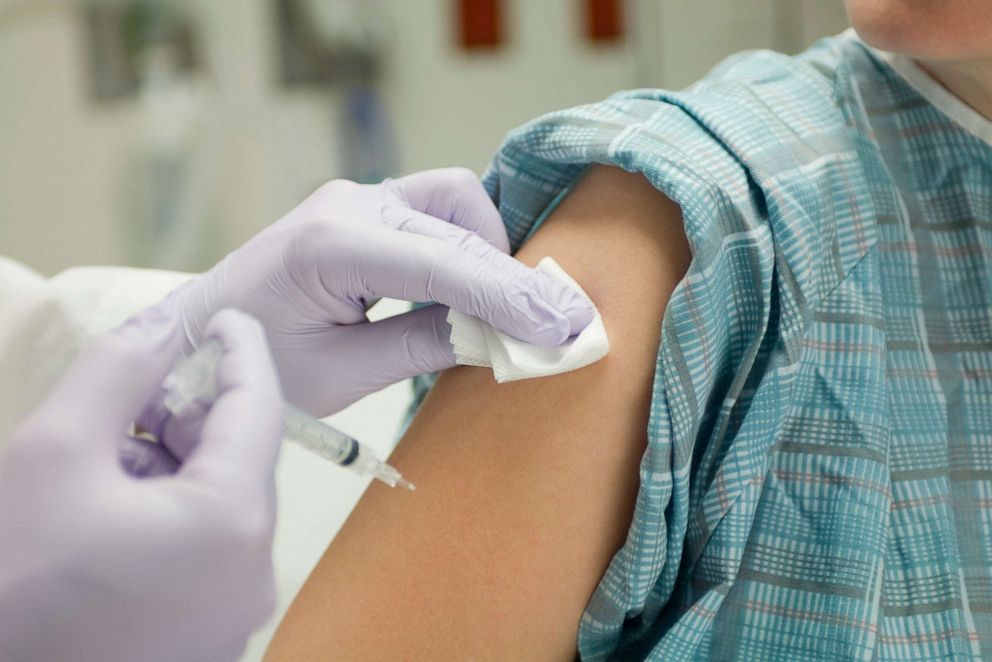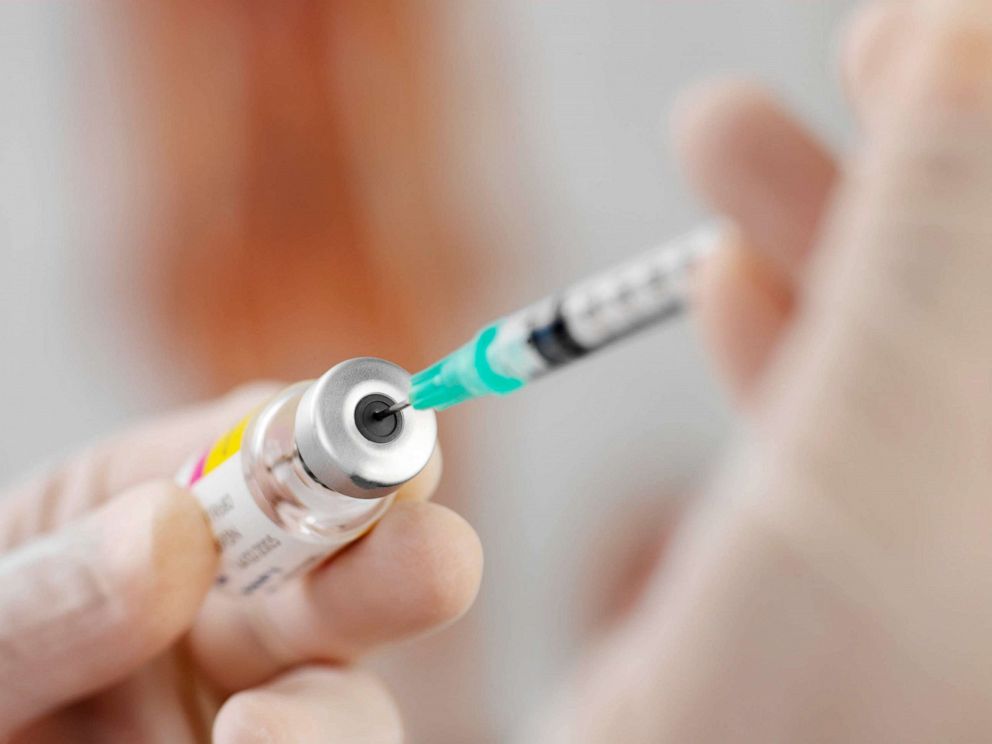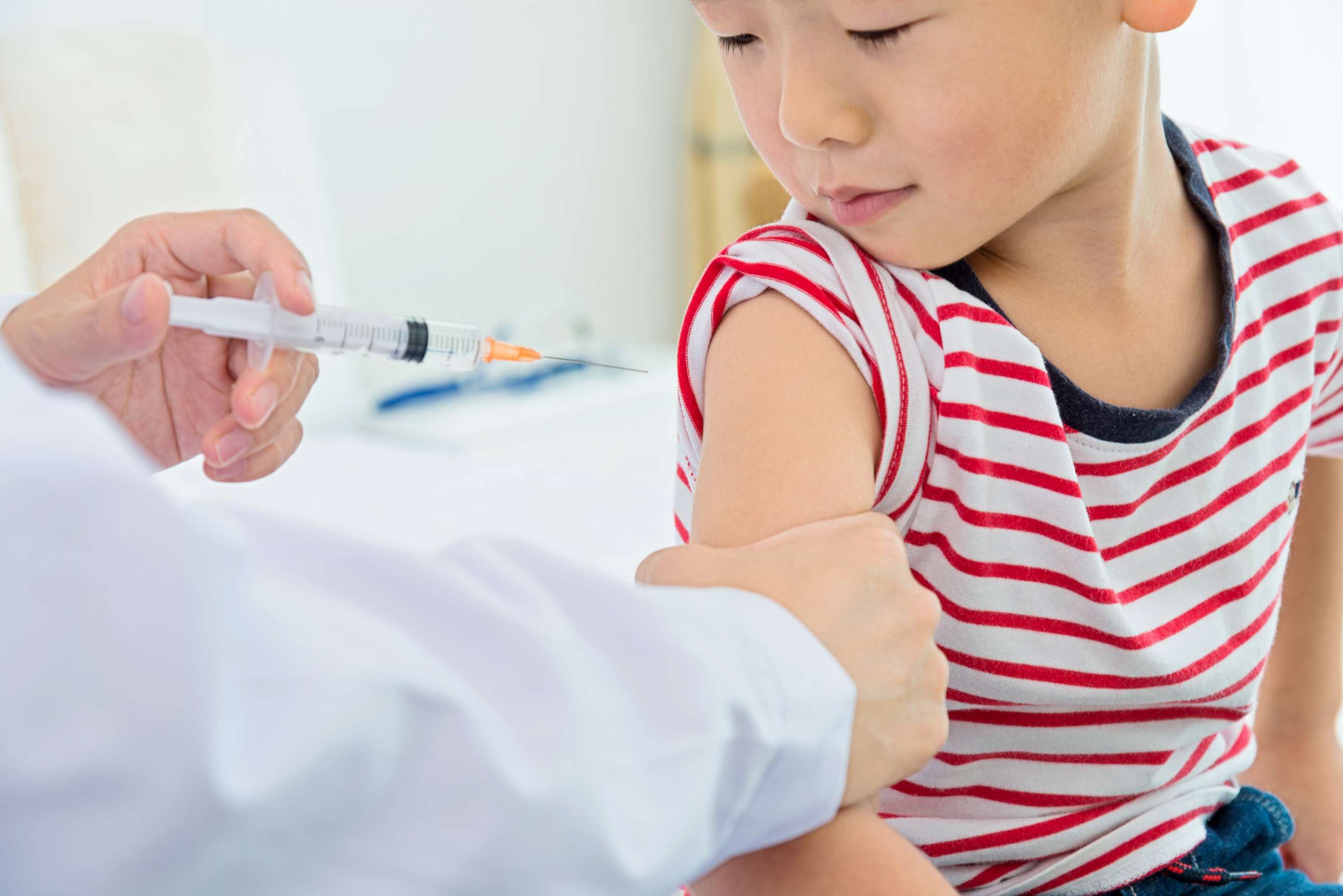Child vaccinations down across the country amid coronavirus fears
Expert fears "mini-epidemics" of otherwise preventable childhood diseases.
As many as 20 states across the country are reporting a rapid decrease in the number of children receiving their routine vaccinations over the past few months, according to a nationwide survey conducted by ABC News. The sudden decline comes as many Americans are fearful to visit their doctors' offices for routine check-ups amid the ongoing coronavirus pandemic.
ABC News reached out to health officials in all 50 states, and every one of the 20 states that responded and said they had relevant data available, from California to North Carolina, said they were seeing at least some sort of decrease in vaccination rates and vaccine orders -- including some with drastic, worrying slumps.
It isn’t only health officials that are concerned. As parents worry for their children's safety, physicians say the lack of vaccinations could lead to a resurgence in usually preventable or managed conditions like mumps or the seasonal flu when the nation is already struggling with a deadly pandemic.
Dr. Sara Goza, President of the American Academy of Pediatrics and a private practice pediatrician in Georgia, told ABC News, “My own volumes had been down 40% and on average 40 to 50% in other parts of the nation.”
“Our greatest fear is to have a vaccine preventable outbreak. That would be devastating to families and our nation. We are making a big effort to tell patients we are open and safe but have a long way to go," she said.
Tune into ABC at 1 p.m. ET and ABC News Live at 4 p.m. ET every weekday for special coverage of the novel coronavirus with the full ABC News team, including the latest news, context and analysis.
Joan Alker, the executive director of Georgetown University’s Center for Children and Families, warned the drop in vaccinations might lead to "mini epidemics" of other childhood diseases, such as measles.
"And this fall, it will be critical to ensure that kids and adults get flu shots when another wave of COVID is expected," Alker added.
The American Academy of Pediatrics this week launched a digital marketing campaign, “Call Your Pediatrician,” to urge parents to get caught up on their vaccines.
"The parents are really scared in many ways," said Dr. Francis DeVito, a pediatrician in Brooklyn, New York, who said he has seen a 75% decrease in the number of in-office patients seen.
"Even for well care visits, when they do show up, there is a reluctance by the parents to vaccinate because they worry if there is a reaction 'what do we do?',” Dr. DeVito said. “They fear what if I have to go to a hospital, an emergency room. It's our job to reassure them there is no difference than before, and these current vaccines are less reactogenic then those of decades in the past.”
In New York City, there’s been a 42% drop in the number of vaccinations administered for children two years old and younger, according to Mayor Bill de Blasio, and a shocking 91% drop in vaccination rates for children over the age of two.
“I'll give you a comparison. The same six-week period of time last year, 2019, almost 400,000 [vaccine] doses were administered in this city,” de Blasio said on Wednesday. “In the six-week period this year, fewer than 150,000. So, something has to be done immediately to address this.”
De Blasio also emphasized that the drop in vaccination rates is especially dangerous this year. Non-vaccinated children are at greater risk of contracting respiratory illnesses such as pneumonia, and are therefore more “vulnerable” both to COVID-19 and MIS-C, the rare new inflammatory illness in children.

Dr. Richard Besser, the former acting director of the Centers for Disease Control and Prevention (CDC), said “there is nothing that we do for children that has more proven health value than getting them fully vaccinated on time.”
“While we are all hoping for the development of a safe and effective vaccine against the new coronavirus, we can’t let our guard down against the diseases for which we currently have vaccines. Measles, whooping cough, and polio are just a few diseases that we rarely see because of the miracle of vaccination,” said Besser, who was formerly ABC News' Chief Health and Medical Editor.
But multiple states are experiencing the same downward trend in the exact time that experts say vaccines are more important than ever.
Pennsylvania has seen a 76% decrease in vaccinations in children ages four to six compared with the previous four-year average, according to Nate Wardle, a spokesperson for the Pennsylvania Department of Health. Vaccinations in children ages 11-18 are down 72%. And Delaware has seen a 52% drop in child vaccinations administered in April 2020 compared to April 2019, Mat Marshall, a spokesperson for the Delaware Department of Justice, told ABC News.
Maryland, California, Idaho, Arkansas and Connecticut and North Carolina have all reported significant decreases during the same time period. The number of doses in Maryland has decreased by 56%; in California, the number of shots given to children up to 18 years of age has plummeted by more than 40%.
“We are very concerned about the significant drop in immunization rates, particularly for children,” said Kelly Haight, a spokesperson for the North Carolina Department of Health and Human Services, where HPV vaccinations, which prevent cervical cancer and are recommended by the CDC for children aged 11 and 12, in the state are down 72% compared to last year.

Officials in Oregon reported they saw a drop in immunizations for all age groups initially with the pandemic, “but a quick recovery for infant immunization.” However, vaccination rates for older kids, teens, and adults has been “slow to recover, if at all.”
“HPV immunization rates have tanked, and show little improvement,” Jonathan Modie, a spokesperson for the Oregon Health Authority, told ABC News. “We also preliminary indications that maternal immunization rates for Tdap, intended to protect newborns against pertussis, may also have nose-dived with a slow recovery."
Florida Gov. Ron DeSantis expressed concern over parents not keeping their children’s immunizations up to date and said the state is also experiencing a decline.
“The surgeon general of Florida is a pediatrician, it’s something he will bring to my attention often because we have seen measles outbreaks in different parts of the country just before all this started and so if you’re not keeping up on that, that’s a problem,” DeSantis said last week.
Some parents, though, said they are torn.
“The first time we went I think it was still too early to really be apprehensive. The second time I was definitely more cognizant of the situation, but went in with a mask on. They had plastic barriers up around the reception area,” said Jessica Weisensell, a first-time mom from Cuyahoga Falls, Ohio, who said her pediatrician’s office was taking temperatures upon arrival and instead of a long wait they were quickly seen. “They were definitely doing everything they could to put everyone at ease.”
Others are saying they are going to wait.
“I don't think there could possibly be a place more germy, despite their best efforts, than a pediatrician's office,” said Kathleen Shortis, a mother of five from Long Island, New York, who canceled the last round of visits and vaccinations for her children.
“The kids aren't going anywhere, school is canceled for the year, there will be plenty of time to catch up when the kids are allowed out and about before they're in large groups again,” Shortis said.

DeVito told ABC News he worries most about the fall as parents become concerned about the upcoming flu season and the demand for vaccines increases.
"In the fall with flu season there is going to be a huge demand and it's actually really unfair to parents and their pediatricians to try and satisfy the necessary requirements for vaccinations in a very condensed time-frame because when people will feel safe to go out and then oh wait school is starting in two weeks. Another panic could ensue,” he said.
Leaders are starting to try and change the trend. Six major hospitals in Los Angeles announced on Thursday they are working on a public outreach campaign to encourage people to go to the doctor, especially to get childhood vaccinations. In New York City, Mayor de Blasio also announced the city would be offering free vaccinations at over 1,000 locations.
The CDC guidance says it is critical for parents to maintain vaccinations as the coronavirus pandemic continues because as states across the country begin to reopen, children may be more at risk without the proper vaccinations.
“As social distancing requirements are relaxed, children who are not protected by vaccines will be more vulnerable to diseases such as measles," the CDC says.
Yet for those who fear going to a doctor’s office right now, some experts say there are creative solutions.
Dr. Julia Skapik, medical director for the National Association of Community Health Centers says their members in underserved communities are getting creative to meet patients where they are to deliver vaccinations, including empty parking lots. “I think the public is not fully aware there are preventive services that are recommended for children during this time and how to do it safely," she told ABC News.
"Every pharmacy provides access to vaccines, and those should be utilized to create convenience and limit exposure for children as opposed to a clinical setting," said Dr. John Brownstein, an epidemiologist at Boston Children's Hospital and an ABC News contributor who also helps run vaccinefinder.org. The website provides individuals with information about the locations of vaccines based on their needs.
What to know about coronavirus:
- How it started and how to protect yourself: Coronavirus explained
- What to do if you have symptoms: Coronavirus symptoms
- Tracking the spread in the U.S. and worldwide: Coronavirus map
Jay Bhatt, a practicing internist and Aspen Health Innovators Fellow, is an ABC News contributor. ABC News' Soo Rin Kim contributed to this report.




